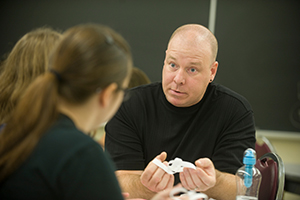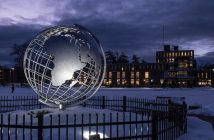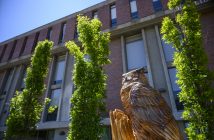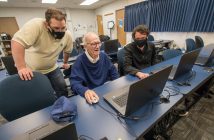Students who are not majoring in math and sciences will learn mathematics in a new, innovative way, thanks to a team of professors who helped secure a $550,600 grant from the National Science Foundation (NSF) – the largest NSF grant in the University’s history.
The funded program, “Discovering the Art of Mathematics: Inquiry-Based Learning in Mathematics for Liberal Arts,” will allow the professors to invent an entirely new combination of pedagogy, teaching and scholarship and create new books for Mathematics for Liberal Arts (MLA) courses – college-level courses whose majors do not require classes like calculus, algebra or statistics.
Students across the country will benefit from their work.
Professor Julian Fleron, a member of the Mathematics faculty for 18 years, and his colleagues applied for the grant.
He says the United States is one of the only places in the world where people proudly say they are “bad at math.”
“We hope to change that perception,” he says. “We hope to do that in our classrooms, challenging our students to help change that perception. And we hope our work will allow other faculty across the country to do that in their classrooms, helping society to have a better appreciation of the role of mathematics in the world around us.”
Fleron has taught almost every mathematics course at the University, other than those involving statistics and probability. And he says Mathematical Explorations, the University’s MLA course for students who need a core course in mathematics but do not have a specific requirement, like art, English or history, is most important to him.
“It is where there is the greatest opportunity to make real changes in how people think about mathematics,” he says.
Fleron and fellow mathematics professors Philip Hotchkiss, Volker Ecke and Christine von Renesse spent about a year prepping for the grant.
“Three hundred and thirty other institutions applied, and only 32 grants were awarded,” says Fleron. “The grant is a major honor. I hope students will understand that mathematics is not just a tool used for applications. It can be explored and enjoyed with many other arts.”
The work the grant will allow University professors to take on will give teachers at other institutions across the country access to concrete, successfully-tested materials to help make learning more student-centered.
Students will be actively involved in their assignments, and they will investigate real mathematics and find opportunities to bridge science and liberal arts. MLA students will say “goodbye” to the traditional lecture-style mathematics course and greet a class setting full of discovery.
Jessica Pendleton ’12 of Worcester, a criminal justice major, hated everything about math until she took Mathematical Explorations: Geometry.
“Explorations was interesting, engaging and employed a hands-on approach to learning,” she says. “I found myself wanting to go to class each week, feeling not only accomplished but excited about what I was learning. It opened my eyes and showed me that mathematics is more than just numbers and equations; it is conceptual, artistic and worth exploring further.”
CJ Tierney ’16 of Framingham, who is studying criminal justice, said his Math Explorations class offers a new way to learn math. “Instead of a lecture class where you take notes and go home to figure the assignments out on your own, I’m learning hands-on,” he says.
Haley E. Batchelder ’16 of Hopkington, an undeclared major, agrees. She says Math Explorations is the first math class she’s actually enjoyed, and the fact that she’s excelling feels great.
“We don’t just learn how to do math,” she says. “We learn what math is and why we’re doing what we’re doing.”
Professor Christine Von Renesse enjoys learning and teaching about the many connections between mathematics and both music and dance. She is not teaching Mathematical Explorations this semester, but she is prepping for grant program students.
Von Renesse is creating a suite of hands-on investigations that involves a maypole ribbon dance. Dancers move in a circle, each holding different colors of ribbon attached to the top of a wooden pole. As the dancers move around the maypole, they intertwine the ribbon into an intricate design.
“I wondered, what kind of patterns can you get, and can you predict them and get any pattern you want?” Von Renesse asks.
Von Renesse and faculty are designing a host of investigations that students will work on for two to three weeks. “This particular assignment demonstrates the fun of being curious about something and trying to figure it out critically,” she adds.
The grant terms will spread over four years, and Von Renesse says professors will work to apply for another. “My wish is for students to see that math is fun and to enjoy the challenge,” she says.
Do you want to learn more or visit a class to see this innovative teaching in person? Email the grant team at artofmathematics@westfield.ma.edu, or visit artofmathematics.westfield.ma.edu.




